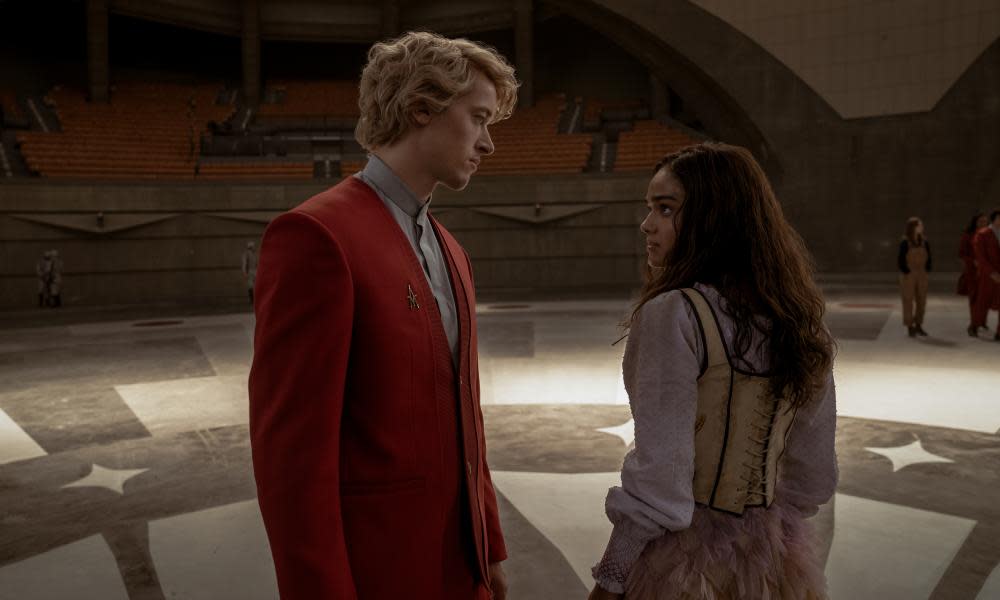The Hunger Games: The Ballad of Songbirds and Snakes review – back to an empty future

It’s easy to lose the will to live halfway through the title, never mind the actual film – in all its exhausting, convoluted silliness. This is a pointless new iteration of IP content from the Hunger Games franchise, based on Suzanne Collins’s original YA bestsellers, which over four movies from 2012 to 2015 confirmed the superstar status of Jennifer Lawrence, playing defiant heroine Katniss Everdeen, one of the starving people in a dystopian future state forced to take part in a bizarre televised survival contest. That initially fierce film series was subject to the law of diminishing returns, but they never quite diminished to zero.
For this prequel, however – taken from Collins’s 2020 novel of the same title – the interest, dramatic momentum and energy have frankly expired, and all we have are the ridiculous outfits, the hallucinatory hairstyles, the zero-suspense action sequences, the standard-issue CGI cityscapes, the non-satirical flourishes about media control and Rachel Zegler (in what is effectively the Katniss role) doing a frankly bizarre suth’n accent in an eccentrically designed country-music-star dress, in her picturesque itinerant poverty, singing her down-home ballads while strumming a guitar which looks as expensive as a Lamborghini. For sure, Jason Schwartzman gets laughs playing the Games’s oleaginous TV host and part-time weather forecaster Lucky Flickerman, but the humour of his role only seems to point up the baffling and strenuously uninteresting solemnity of everything else.
This is a prequel in which the titular songbirds and snakes are tropes symbolising beauty and vicious disloyalty, giving us the origin story of the state’s malign president, Coriolanus Snow, originally played by Donald Sutherland, as well as what is effectively the origin of the Games themselves as they were understood in the Katniss era. Sixty-four years before the events of the first film, young Coriolanus (played by Tom Blyth) is one of a shabby-genteel distinguished family and at this stage is a decently intentioned young man who finds himself having to “mentor” one of the downtrodden contestants in the cruel games – this mentoring being a proto-reality-TV novelty intended to boost ratings.
Snow’s protege is Lucy Gray Baird (Zegler), the entirely preposterous singer from a travelling band called the Covey, whose warbling performances might win the public’s heart. The Games are devised by the coldly calculating Casca Highbottom (Peter Dinklage) and the “head game-maker” is the scary and snake-obsessed Volumnia Gaul (Viola Davis) whose first name may or may not in some Shakespearean sense indicate a Freudian relationship with young Coriolanus. Through a series of tiring plot contortions, Coriolanus gets his own kind of specious underdog status by having an emotional connection with Baird bending the rules to help her and often finding himself in danger alongside her; he is to encounter violence and betrayal and to discover in himself a streak of ruthlessness and also cut his blond hair, making him look worryingly like Draco Malfoy.
As ever, there is much talk about the Games as a TV event; the TV monitors have that old-fashioned design and sepia colour of something out of Orwell’s Airstrip One. But we never see any actual people settling down to watch anything on TV. The ruling class are evidently uninterested in this medium and the poor look like smudgy-faced figures out of John Steinbeck for whom TV is surely an alien idea. This movie finally ties itself into various knots to prefigure the later world of Katniss, but the time to end the Games came long ago.
• The Hunger Games: The Ballad of Songbirds and Snakes is released on 16 November in Australia and on 17 November in the US and UK.

 Yahoo Movies
Yahoo Movies 
